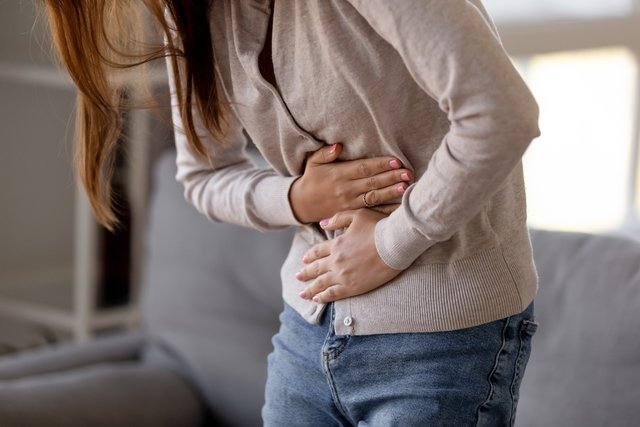Nervous gastritis is a condition that typically causes symptoms during or after periods of increased stress or anxiety. Although it does not cause stomach inflammation like classic gastritis, its symptoms are very similar, including the feeling of a lump in the throat, heartburn, burning and a bloated stomach.
Also known as functional dyspepsia, nervous gastritis is curable and can be treated with changes in diet, lifestyle changes and the use of medications prescribed by the gastroenterologist, such as antacids or soothing the gastric mucosa.
However, nervous gastritis is just a popular term used for functional dyspepsia. This is because stress and anxiety alone do not cause gastritis, but they can increase the production of acid in the stomach, causing symptoms similar to those of gastritis.

Nervous gastritis symptoms
The main symptoms of nervous gastritis are:
- Stitch-shaped stomach pain;
- Acidity and burning in the pit of the stomach;
- Feeling of a full stomach;
- Nausea and vomiting;
- Frequent burping.
Symptoms of nervous gastritis can appear at any time, however they are more evident in periods of stress or anxiety, such as when preparing for a test or a lot of pressure at work, for example, and can be recurrent in some people.
Although the symptoms of nervous gastritis do not always appear simultaneously, they can worsen during meals during periods of disease crisis. Some of these symptoms may also be present in other types of gastritis and confuse the diagnosis. Know how to differentiate the types of gastritis.
Symptom Test
To find out the risk of having nervous gastritis, indicate the symptoms you may be experiencing in the test below:
The symptom test is only a guidance tool and does not serve as a diagnosis and should not replace consultation with a gastroenterologist.
How to confirm the diagnosis
The diagnosis of nervous gastritis is normally made by a gastroenterologist by evaluating the symptoms presented and the person’s health history.
If you want to assess your risk of nervous gastritis, make an appointment with the gastroenterologist closest to you:
Taking care of your health has never been easier!
In addition, the doctor may also order tests to confirm the diagnosis, such as blood count, endoscopy, abdominal ultrasound, thyroid function and inflammatory markers.
Main causes
Nervous gastritis occurs mainly due to emotional situations, such as anxiety, stress and nervousness, which leads to increased production of gastric juice, resulting in the development of symptoms similar to those of gastritis.
It is important to remember that nervous gastritis does not exist, being just a popular term used for functional dyspepsia. This happens because emotional stress and anxiety do not cause inflammation in the stomach, but they can increase the production of gastric acid, causing symptoms similar to gastritis.
Physical stress, such as what happens in cases of severe trauma, severe burns or intracranial trauma, for example, can alter gastric pH, causing stress-induced gastritis.
How the treatment is carried out
Treatment for nervous gastritis must be indicated by a gastroenterologist and may include:
1. Medicines
The doctor may recommend the use of medications to reduce the production of stomach acid and improve symptoms such as pain, burning and acidity, and the use of acid production inhibitors, such as omeprazole or pantoprazole, may also be indicated. In addition, the doctor may also prescribe the use of antidepressants and antacids.
2. Diet
To reduce the production of acidity in the stomach and alleviate the symptoms of pain and burning, it is recommended to avoid the consumption of foods rich in fat, such as red meat, sausages, sausages, bacon, whole milk, sauces of any type, yellow cheeses, cream cheesestuffed biscuits and sausages in general.
During a nervous gastritis attack, it is recommended to prioritize foods that are easy to digest and low in fiber, such as:
- Low-fat meatssuch as chicken, turkey and white fish;
- Cooked vegetablessuch as carrots, eggplant, pumpkin and zucchini;
- Fruits without peelsuch as apple, peach, papaya, banana and pear;
- Cereals and tubers such as white rice, pasta, potatoes and skinless sweet potatoes;
- Dairysuch as skimmed milk, natural yogurt and white cheeses, such as ricotta and light curd;
- Natural seasoningssuch as fine herbs, garlic, onion, parsley, coriander and oregano.
After crises, you can gradually resume your normal diet, and it is important to have a balanced and healthy diet. Other important precautions are not lying down after meals, avoiding drinking liquids during meals, eating slowly, chewing food well, avoiding the consumption of alcoholic beverages and cigarettes.
See more details about what to eat in case of gastritis:
3. Psychotherapy
Depending on the degree of stress, anxiety and/or nervousness, the doctor may also recommend psychotherapy to help treat emotional problems and improve gastritis symptoms.
4. Physical activities
Practicing physical activities regularly is important to improve digestion, reduce stress and anxiety and increase the production of hormones that give a feeling of pleasure and well-being, helping to alleviate the symptoms of the disease.
5. Home remedies
Some home remedies that can help treat nervous gastritis are peppermint, passion fruit, lavender and ginger tea to relieve nausea and vomiting, and activated charcoal tablets to reduce the production of intestinal gas. Discover other home remedies for gastritis.
Is nervous gastritis curable?
Nervous gastritis has a cure, and for this it must be treated with changes in diet and lifestyle and the use of medications prescribed by the gastroenterologist, such as antacids, antidepressants, acid production inhibitors.

Sign up for our newsletter and stay up to date with exclusive news
that can transform your routine!
Warning: Undefined array key "title" in /home/storelat/public_html/wp-content/plugins/link-whisper-premium/templates/frontend/related-posts.php on line 12
Warning: Undefined array key "title_tag" in /home/storelat/public_html/wp-content/plugins/link-whisper-premium/templates/frontend/related-posts.php on line 13



